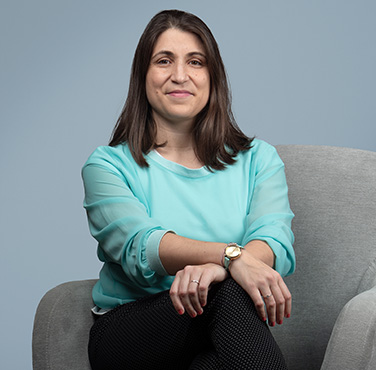The Human Safety Net
Young children and digital media.
How families learn healthy use of smartphones, TV and iPads.
Digital media shape our everyday lives. How does this affect the development of young children? Raquel Paz Castro is researching this topic at the Marie Meierhofer Institut für das Kind (MMI) and knows the areas in which parents would appreciate support.
Ms Paz Castro, you spent a year observing families with children up to five years old for the long-term study “Children and Digital Media”. What were the results?
We’re still analysing the data, but we know, for example, that stressed parents more readily and more often allow their children access to digital media.
For example, some parents have to juggle their jobs, childcare and leisure activities. That’s why it’s so important that our information events, direct communication and low-threshold support also offer care for parents. We help them to better cope with stress and create more space for interaction with their children.
Are there concrete figures on how much time a child should spend in front of a screen?
That’s a difficult question. Digital media such as smartphones, computers or TV can be used in many different ways – from hours spent watching to playing memory games or learning vocabulary. The key is to find out what content is useful. Essentially, the younger a child is, the less time they should spend in front of a screen. Young children learn little from digital media and miss out on valuable real-life experiences at the same time.
I also advise parents to observe their children’s digital media consumption. An hour in front of a screen affects children with a varied daily routine in an engaging environment differently than children who sense little interest from their parents.
There’s a huge gap between the results of studies and the everyday lives of families. How do you close it?
At MMI, we see ourselves as a bridge between science and practice, but also vice versa. We want the results of the “Children and Digital Media” project to benefit those who truly need them. We conducted discussions in small groups and individually to learn about parents’ specific needs.
We discovered that they find over 50 different situations in which children use digital media challenging, and lack information specifically on this topic. This shows that every family is unique in terms of its needs.
So, you know the parents’ needs. How and where can you offer support?
Parents should not feel left alone with their problems. However, since each family’s situation is different, they need individual advice. We are currently developing this with our “KiDiMCoach” project. This WhatsApp tool is designed to provide parents with individual support on the topic of children’s use of digital media. “KiDiMCoach” is no substitute for personal advice, but it does offer low-threshold self-help opportunities. We’re going to test the tool in a pilot phase in the second half of 2025.
To what extent do parents need to consider themselves and their own behaviour?
I hope that parents don’t judge each other when families use digital media differently. Parents want the best for their children, but achieving this goal is becoming increasingly complex. Smartphones control our daily lives and are so often at hand. Children need to learn healthy ways to use them. The healthier the parents’ use of digital media is, the better role models they are for their children.

Raquel Paz Castro
Study Project Manager

 Contact
Contact
 Find an agency
Find an agency









 Close
Close




